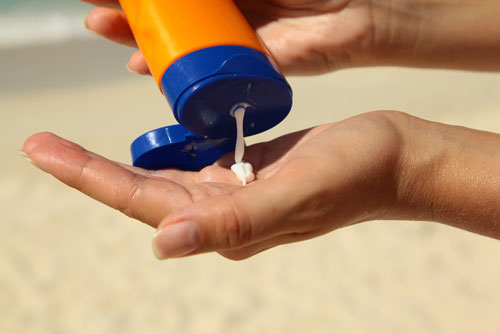Most of us slather sunscreen on our bodies without giving it a second thought.
We figure we’re being diligent by avoiding sunburn. And after the sunscreen has done its job and we shower it off, it’s gone.
Except it’s not.
A new study shows that our bodies absorb alarming amounts of sunscreen chemicals.
The research was conducted by the FDA. Scientists had 48 healthy volunteers use one of four sunscreen sprays or lotions. They applied the products once on the first day, then four times a day for the next three days.[1]
The sunscreens contained varying combinations of six active ingredients… oxybenzone, avobenzone, octocrylene, homosalate, octisalate, and octinoxate.
The researchers found the chemicals were absorbed into the volunteers’ skin at levels beyond the FDA’s safety limit. In most of the volunteers, that happened after just one application.
Worse still, the chemicals stayed in their bodies. Avobenzone, octisalate, and octinoxate remained at high levels for a week. Homosalate and oxybenzone hung on for three weeks before beginning to break down.
Dr. Janet Woodcock is director of the FDA’s Center for Drug Evaluation and Research. She said the study finding “calls for further industry testing to determine the safety and effect of systemic exposure of sunscreen ingredients…”[2]
What’s known about these chemicals so far isn’t encouraging.
Oxybenzone is linked to endocrine disorders. These can lead to issues like fatigue, anxiety, depression, thyroid problems, and sexual dysfunction.[3]
A study published in the journal Reproductive Toxicology found that pregnant women who use sunscreens with oxybenzone risk having a baby with a serious birth defect that damages digestion.[4]
Avobenzone is strongly linked to skin allergies. A study published in the journal Chemosphere found that it turned toxic when exposed to chlorine, which is commonly used in swimming pools.[5]
Homosalate can accumulate in the body and disrupt estrogen, androgen, and progesterone hormone levels.
Octisalate is linked to allergies and compromised immunity.[6]
Octinoxate is associated with heart disease, miscarriages, and lower sperm counts.[7] [8]
Octocrylene can cause acne and rashes.
The 5 Best (and 4 Worst) Sunscreens
You shouldn’t routinely use sunscreen. It blocks your body’s ability to make vitamin D and nitric oxide. Both are crucial to good health.
Instead, apply sunscreen only when you are in danger of burning.
And if that’s the case… Don’t use chemical sunscreens.
Instead, stick to products with a base of zinc and/or titanium.
The Environmental Working Group annually ranks sunscreens based on their safety and effectiveness. Here are five brands that get the highest ratings:[9]
- All Terrain
- Babo Botanicals
- Badger
- Blue Lizard
- ThinkSport
Four products that got the lowest ratings are Banana Boat, Neutrogena, Panama Jack, and CVS brand.
You want to protect your skin, not have it invaded by chemicals.
Editor’s Note: If you’re worried about skin cancer, you need The Skin Protection Protocol from Independent Healing. Find out why following mainstream advice about sun exposure shortens your lifespan as much as smoking…and why one dermatologist congratulates his patients when they get basal cell cancer. To subscribe, go HERE.
Related Articles
7 Best (and 4 Worst) Sunscreens
Five Natural Alternatives to Sunscreen
5 Best (and 2 Worst) Sunscreens
Like this Article? Forward this article here or Share on Facebook.
[1]https://www.eurekalert.org/pub_releases/2020-01/jn-saa011620.php
[2]https://consumer.healthday.com/cancer-information-5/sunscreen-and-lotion-health-news-648/sunscreen-chemicals-absorbed-into-body-study-finds-754101.html
[3]https://www.niddk.nih.gov/health-information/endocrine-diseases
[4] https://www.consumerreports.org/sunscreens/what-you-need-to-know-about-sunscreen-ingredients/
[5] https://tropicsport.com/blogs/posts/what-s-wrong-with-sunscreens-containing-avobenzone
[6] https://www.ewg.org/skindeep/ingredients/704204-OCTISALATE
[7] https://www.ewg.org/skindeep/ingredients/704203-octinoxate
[8] http://www.safecosmetics.org/get-the-facts/chemicals-of-concern/octinoxate/
[9]https://www.ewg.org/sunscreen

